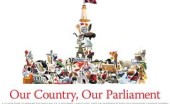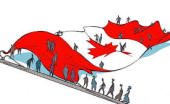Johannah Bernstein post: "eternally proud of my father’s extraordinary aeronautical engineering. legacy. here is a photo of the Canadair Water…
Wednesday Night #1754
Written by Diana Thebaud Nicholson // October 14, 2015 // Wednesday Nights // Comments Off on Wednesday Night #1754
Gerald Ratzer outdid himself in relating historical events associated with 1754, including mention of the founding of Columbia University in New York, George Washington’s participation in several battles in the run-up to the French and Indian War (Seven Years’ War) and surrender of the oddly-named Fort Necessity to the French. Gerald outdid himself, however, with the information that “Horace Walpole, in a letter to Horace Mann, coins the word serendipity” . Immediate googling around the table produced the further information that “he [Walpole] said he formed it from the Persian fairy tale The Three Princes of Serendip, whose heroes “were always making discoveries, by accidents and sagacity, of things they were not in quest of”. The name stems from Serendip, an old name for Sri Lanka (aka Ceylon), from Tamil Ceralamdivu, Sanskrit Simhaladvipa and Arabic Sarandīp (سرندیپ). Parts of Sri Lanka were under the rule of Tamil kings for extended periods of time in history. Kings of Kerala, India (Cheranadu), were called Ceran Kings and divu, tivu or dheep, which means island. The island belonging to the Chera King was called Cherandeep, hence Sarandib by Arab traders” The things you learn at Wednesday Night!
As would be expected, with only five days to go, the discussion was packed with comments about the latest election news. About half of those present had contributed to the remarkable surge in advance poll voting, but no-one knows whether that augurs an increase in the overall number of voters, or merely is an indication that committed voters availed themselves of the opportunity over the long holiday weekend.
The consensus is that there will be a minority government, but the hue remains a mystery. Whatever happens, everyone is prepared for a long night next Monday as the BC vote will be important to the outcome. Meantime, the Conservatives appear to be taking somewhat desperate last-minute actions and there was some derision of the featured appearance of the Ford brothers -Rob & Doug- at the Tory campaign event in Etobicoke and the news that the Fords have helped organize the rally on Saturday night at which Mr. Harper will be speaking. However, one Wednesday Nighter, who has lived in Toronto for some time, reminds us that contrary to urban Toronto, in the 905 area, the “Ford nation” influence is pervasive and very important.
There were no mitigating comments about that ad campaign targeted at Chinese and Punjabi-speaking voters in Vancouver and Toronto that claims Justin Trudeau supports the sale of marijuana to children, the expansion of safe injection sites and the establishment of neighborhood brothels.
As CBC points out “As for brothels, the Conservatives have connected that [issue] to Trudeau’s vote against the Tories’ prostitution bill, legislation introduced after the Supreme Court of Canada struck down in a unanimous decision the previous law as unconstitutional. However, the Liberals have no policy regarding the legalization of prostitution, let alone brothels in communities.”
The inimitable Tony Deutsch (a very welcome returnee after his idyllic summer sojourn) treated us to an entertaining and instructive history of the twists and turns of Canadian regulation of prostitution. As they say on Facebook, ‘it’s complicated’. A story in the Globe & Mail last year Canada’s new prostitution laws: Everything you need to know sheds some light, albeit not nearly as entertainingly as Tony. His conclusion? The German model is superior to the Swedish one on which several countries are using as the basis for their own legislation. Concluding his lecture, he mentioned that at least one German municipality has opted to accommodate brothel facilities on a floor of the City Hall, provoking several to wonder whether Westmount might (someday) do the same.
P R E A M B L E
Ada Lovelace was the daughter of mathematician Annabella Milbanke and the poet Lord Byron. But that’s not why October 13 is Ada Lovelace Day
While Canadians basked in a politically correct -and particularly lovely- Thanksgiving holiday, in the U.S., “Columbus Day” is an increasingly less acceptable appellation for what is usually one of the most enjoyable holiday weekends (lacking the stress of gift-giving and generally feverish holiday celebration). More and more U.S. cities, and even 4 states -most recently the Alaska– now celebrate the second Monday in October as Indigenous People’s Day. The movement reflects growing recognition that Christopher Columbus was not a particularly pleasant individual and that his arrival (NOT ‘discovery’) launched a large-scale genocide and European colonization throughout the Americas.
As Reuters puts it: “Christopher Columbus himself, of course, has always been a somewhat problematic historical character: unreliable navigator, relentless self-publicist, chaotic colonial administrator and, many historians believe, probable mass murderer. … Franciscan friar Bartolome de la Cassas estimated that within the first 14 years of the 1494 establishment of a colony, some 3 million people — 98 percent of the pre-discovery population — had died of disease, slaughter by the Spanish or been worked to death as forced labor.”
In this context, we suggest the fascinating 1491. “Before it became the New World, the Western Hemisphere was vastly more populous and sophisticated than has been thought—an altogether more salubrious place to live at the time than, say, Europe. New evidence of both the extent of the population and its agricultural advancement leads to a remarkable conjecture: the Amazon rain forest may be largely a human artifact.”
Columbus certainly would not have received a Nobel Peace Prize (although some past laureates have been pretty dubious). We believe that the Committee chose well this year in selecting the coalition of civil society groups known as the Tunisian national dialogue quartet for its work in helping bring the country back from the brink of civil war in 2013. Two other Nobel awards are also of great interest.
As our friend Nick Rost van Tonningen says of the 2015 Nobel Prize in Medicine, “it is a blow struck for Chinese traditional medicine” – Tu Youyou is an 84 year-old pharmaceutical researcher long associated with the Academy of Chinese Traditional Medicine who during the Mao Tse Tung era developed an anti-malaria drug, artemsinin, from the sweet wormwood plant after having learnt from her study of ancient traditional medicine books that an extract from the plant had been used as far back as 400 AD to treat fevers.
The Nobel laureate for Economics is a popular choice among his peers and the many concerned with issues of poverty, inequality and development issues. The editorial board of Bloomberg is effusive: “Angus Deaton, this year’s winner of the Nobel Memorial Prize in Economic Sciences, is a rarity: a careful social scientist and an honest policy wonk. In recent years, economics has had no better champion. … Deaton has been more than a pioneer of mathematical and statistical sophistication in economic research. He’s set the best possible example of how to apply those skills to policy. His work on development expresses real moral urgency — he sees global inequality as a call to action — yet he is scrupulous in recognizing the limits of what is feasible. A hallmark of the entire Deaton canon: no wishful thinking.”
The interview on PBS Newshour (Nobel laureate hopes prize will spur more debate on inequality) is delightful and yields this particularly mordant observation, “you know, the very word data means given. And yet most of the numbers we have are not given. They’re produced by statistical offices, many of whom are under terrible budget pressure and threats from politicians who don’t understand how important the numbers are.”
This year’s Thanksgiving holiday was unusually fraught for many and no holiday for Elections Canada and campaign workers.The good news is that the advance poll turnout of 3.6 million was up 71% from 2011. The pollsters continue their frenzied activity and the pundits try to keep up with their analyses. Pretty much everyone points to a rise in the LPC fortunes, but what does that mean in terms of seats? And, as the fortunes of the Party improve, there is an uptick of sympathetic reporting and profiles of Justin Trudeau. However, it remains highly unlikely that there will be a majority government which makes the views of UBC’s Professor Maxwell Cameron Minority government could be good for our democracy particularly pertinent.
“As the distinguished political scientist Peter Russell says, our first-past-the-post electoral system often creates “false majority” governments – governments that have more than half the seats but fewer than half the votes. If such a government only represents its base, it can be unresponsive to the majority.
Many voters will head to the polls thinking they are choosing the next prime minister. In fact, we elect our local Member of Parliament. The prime minister will be the party leader able to earn the trust and confidence of the House of Commons.
If no party wins a majority of the seats in the House, the Governor-General will invite the party with the most seats to form the government.
Such a government might negotiate a “supply and confidence” arrangement with other parties to ensure the government survives votes of non-confidence and passes money bills. Or it could form a coalition in which cabinet and other appointments are shared.
Minority governments are commonplace in Canada. In the 28 elections since and including 1921, 11 have resulted in minority governments. They tend to be brief, lasting less than two years, but they can be very productive. In fact, minority governments intentionally co-operating across party lines brought us the Canada Pension Plan, bilingualism, the new Canadian flag and Medicare.”
There is one fly in the ointment – actually more than one, but we won’t go there today. Dan Breznitz, the Munk Chair of Innovation Studies and co-director of the innovation policy lab at the Munk School of Global Affairs, reminds us that Canada’s leadership candidates don’t know what innovation means
“Canada’s economy is not doing well. The only way to ensure continuous economic growth is through innovation. But three things are clear: Our political leaders have failed us on this front for the past 15 years, those now campaigning to be our leaders offer no new ideas, and when they talk and write about innovation, they reveal a shocking lack of basic understanding about what it is.
Innovation is not the invention of new technologies and products. Innovation is the complete process of taking new ideas and devising new or improved products and services that are then sold in the marketplace. The true impact of innovation was not in the invention of the internal combustion engine or the first automobile – the true impact was the continuous implementation of large and small inventions to make the car a better and cheaper product, to improve its production and to continuously find ingenious ways to sell, market and service it.”
This has not discouraged our Alexandra Greenhill, one of 3 North American finalists in the Cartier Women’s Initiative Awards – the international competition for women entrepreneurs organized by Cartier, the Women’s Forum, McKinsey and INSEAD. Needless to say, we are rooting for her!
Despite our overwhelming preoccupation with the Canadian elections – happily, soon to be over – the world continues to turn and important events continue to transpire, including last week’s The Annual Meetings of the International Monetary Fund (IMF) and the World Bank Group (WBG) where key issues included Wrangling over the IMF succession and US capital
Brookings analysis of The domestic controversy over China’s foreign aid and the implications for Africa highlights a restlessness among the Chinese general public that we do not often see discussed.
Since Russia -and now Iran- have moved into the arena, the situation in Syria is more confused and confusing by the hour while NATO ally Turkey, always worried by the prospect of an independent Kurdish state, has warned the United States and Russia it will not tolerate Kurdish territorial gains by Kurdish militia close to its frontiers in north-western Syria. In Syria, Russia And Reality, David Jones eschews diplospeak to state the case clearly:
“Essentially, the West had its chance in Syria. We assumed the “Arab Spring” would whisk Assad away as were various other regional tinpot dictators. Instead, his forces demonstrated remarkable loyalty (a point that needs investigation) while his opponents couldn’t organize an Eid holiday banquet. Bluntly, had the NATO-West wanted to make Assad disappear, we had the military capability to do so in short order—just look at the military “order of battle” for Turkey, Germany, France, UK, etc. Syria would have had “regime change” in weeks.
But we didn’t. Now Russia is going to have a go.”
Israelis are again living in fear and panic, and Palestinians seem despairing at the failure of peace efforts and the sense that Israel’s occupation of the West Bank and East Jerusalem, and settlement building, will never end, prompting concerns that a third intifada is taking shape. Behind Palestinian-Israeli attacks, angry youth and women … and al-Aqsa
Kimon points us to Half of world’s wealth now in hands of 1% of population – report and comments: “This is really troublesome and unsustainable. The ‘winner takes all’ reality contrasts with the illusion of trickle down economics. It is a global problem which must be addressed on a global scale. Given the high transnational mobility of capital and entrepreneurs, it cannot be dealt with solely at the local or national level. It is not a question of eliminating inequality (in my view undesirable) but reducing the enormous gaps between the very rich and the very poor.”
The run-up to the U.S. elections is heating up with the first debate between the Democratic candidates. And yes, there are more than two. Elaine Kamarck of Brookings [How the Democratic candidates will try and break out of the pack tonight] comments that Martin O’Malley will likely “remind people that the party needs a generational facelift. Hillary is about to turn 68. Sanders just turned 74. Jim Webb is 69 and Lincoln Chaffee is 62. At age 52, O’Malley is by far the youngest candidate on the stage. Expect him to try to appeal to voters on this topic one way or another. Finally, attention will be paid to the potential candidate who is not on stage – Vice President Joe Biden. If he gets into the race he would have to support the Obama Administration on most everything and that could make the next debate even more interesting.” The NYT First Draft was more direct: “this debate is going to be about Mrs. Clinton, just as the first Republican debate was about Donald J. Trump. Mrs. Clinton has the most to gain and the most to lose. She has the advantage of having done this before. But she has the challenge of facing an audience that has followed her career on the public stage since 1992, with many voters holding long-formed opinions of her that might be difficult to change. [UPDATE: Yes, Bernie Sanders Defeated Hillary Clinton in the Democratic Debate. Here’s Why ] All in all, the debate was civil and there were none of the antics of the Republican candidates some of whom become more bizarre by the minute. Not to be missed: David Brooks: The Republican Party is producing “leaders of jaw-dropping incompetence”.
Fans and skeptics of renewable energy, do see How is the world’s first solar powered airport faring?, BBC’s report on Cochin International Airport, Kerala. It is now the first airport in the world to run completely on solar power. Also check out Bioenergy is an Alberta-grown solution … the province’s bioenergy sector is a $2-billion industry, supporting more than 5,000 jobs, directly and indirectly, with an impact of more than $300 million on labour income and nearly $800 million on provincial GDP. Over the past decade, the total capital investment in bioenergy facilities exceeded $600 million.
The ranks of Wednesday Night authors continue to expand:
John Ciaccia’s new book, Call Me Giambattista — A Personal and Political Journey will be launched on October 28 by McGill Queen’s.
Margo Somerville’s latest, Bird on an Ethics Wire — Battles about Values in the Culture Wars will be published in November
and
Beryl Wajsman has announced on Facebook that he’s writing a book:
“I thought Thanksgiving would be a good day to announce that for a good part of the next eight months, with whatever free time I can muster, I’ll be putting the finishing touches on my first book. I’ve titled it “IN THE ARENA: Raising conscience in an unconscionable age”. It will be published in the spring/summer of 2016. The subtitle describes what I’ve tried to do in my work. I hope you’ll appreciate it. The past three decades have been ones of inelegant and ungracious self-absorption. Ones where the race for position has overtaken the pursuit of principle. Where few dare to care. It has been an era defined by too many people running between the raindrops just to get ahead. An age coloured by false piety, ingratitude and lack of courage. It is a far cry from the time my generation came to political maturity “dreaming the dream.” Activism in this age, is not easy. It is often lonely. One is often the victim of betrayals, smears and threats.”



